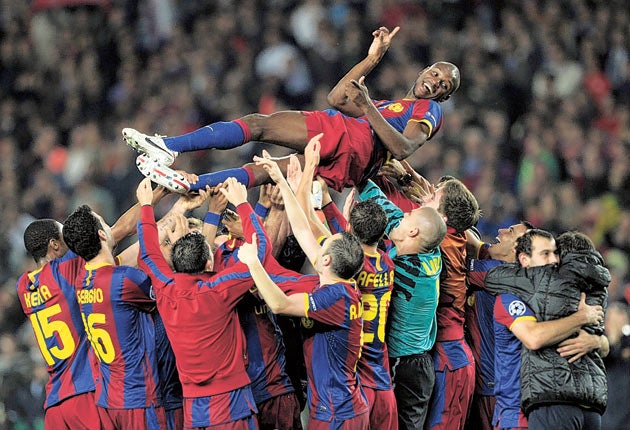
Your support helps us to tell the story
From reproductive rights to climate change to Big Tech, The Independent is on the ground when the story is developing. Whether it's investigating the financials of Elon Musk's pro-Trump PAC or producing our latest documentary, 'The A Word', which shines a light on the American women fighting for reproductive rights, we know how important it is to parse out the facts from the messaging.
At such a critical moment in US history, we need reporters on the ground. Your donation allows us to keep sending journalists to speak to both sides of the story.
The Independent is trusted by Americans across the entire political spectrum. And unlike many other quality news outlets, we choose not to lock Americans out of our reporting and analysis with paywalls. We believe quality journalism should be available to everyone, paid for by those who can afford it.
Your support makes all the difference.The France defender Eric Abidal will have a liver transplant in the next few weeks, Barcelona said yesterday. Last year, Abidal had surgery to remove a tumour and was back playing seven weeks later. He took part in the Champions League final victory over Manchester United in May.
Yesterday, experts said there was no reason why the 32-year-old could not play again. Although a liver transplant is a major procedure, the cells of the liver renew themselves within 48 to 72 hours. Official advice for drinkers to avoid alcohol on two or three days each week is based on the observation that this is sufficient time for the organ to recover.
The immediate challenge for Abidal will be recovering from the surgery to remove his diseased liver and replace it and allowing the incision in his abdomen to heal. In an otherwise fit young man, this should not take more than six weeks to two months.
In the longer term his prospects depend on the nature of his illness. Liver tumours can be benign or malignant. In an interview after his operation last year, Abidal appeared to confirm that his tumour was malignant. "Fighting cancer was my Champions League," he told French television. "It wasn't easy, especially for my family."
Abidal may need to take anti-rejection drugs for the rest of his life. These will suppress his immune system and make him more vulnerable to minor infections. This is often the aspect patients find hardest to adjust to.
Abidal is not the first sportsman to return to competition after serious illness. Lance Armstrong was treated for testicular cancer in 1996 and went on to win the Tour de France seven times.
Join our commenting forum
Join thought-provoking conversations, follow other Independent readers and see their replies
Comments